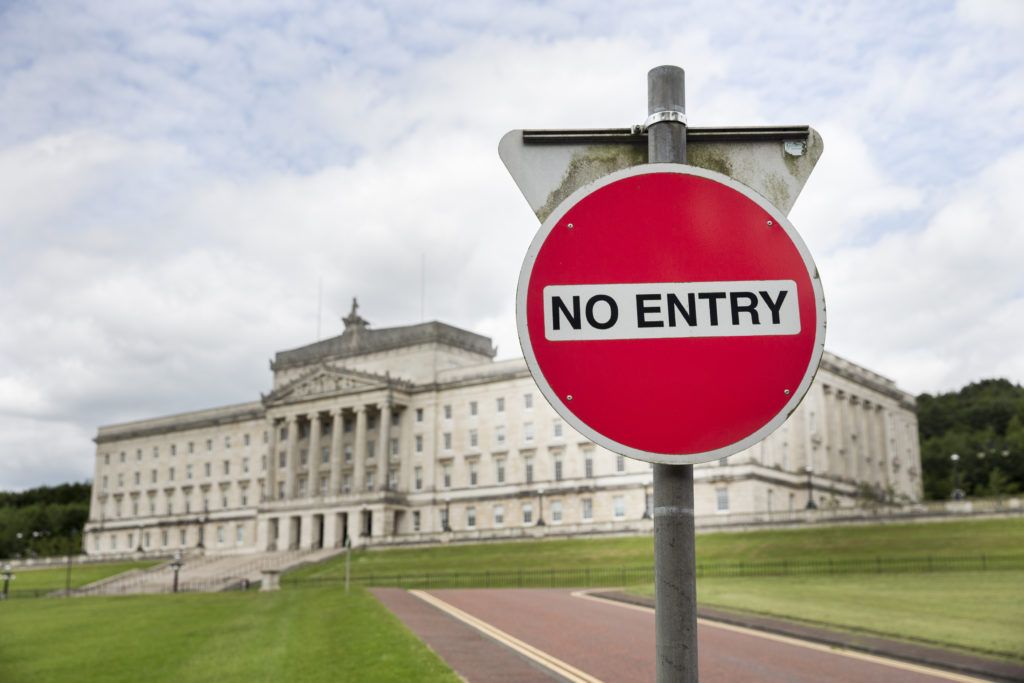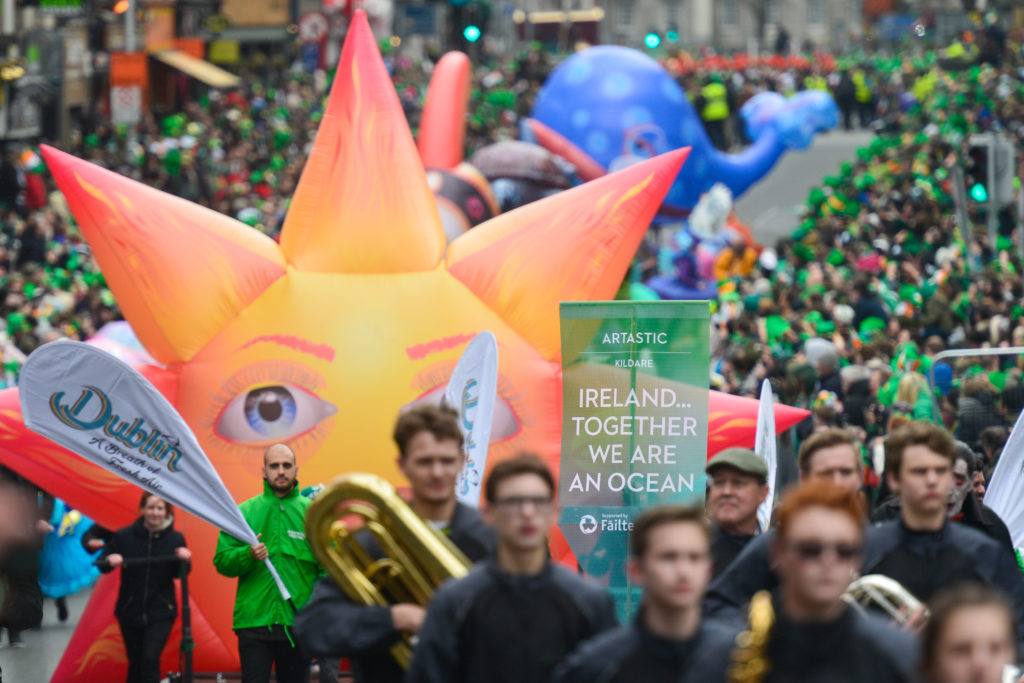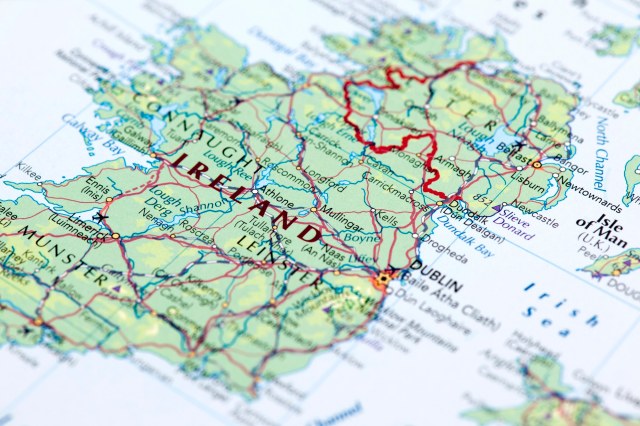Getty Images

With the EU’s €50 billion legacy money half-visible on the table, and the rights of EU/UK expatriate citizens soluble, it is likely that a deal on ‘progressing’ the Brexit talks to ones on trade will be struck when Theresa May lunches with Jean-Claude Juncker today (December 4). On Wednesday is the key meeting of the Commission which will make its recommendation to the Council of Ministers before next week’s summit.
But if two traffic lights have turned green and amber, a red one has lit up over the Irish border issue.
Despite agitating for thirty years for the UK to leave the EU, advocates of Brexit manifestly failed to seriously consider the only place where the EU and UK have a land frontier. Moreover, that is where economic practicalities – and airily impractical improvised ‘solutions’ to them – coincide with questions of identity that are simultaneously profound, subtle and visceral. My own MP, Kate Hoey (Labour, Brexit) in Vauxhall, went all Trump recently by suggesting the Republic could pay to build its own customs border wall.
One side in this debate knows about modes of discourse in which history, memory and myth abound. The British side flounders around in a history whose most basic elements they are ignorant of – as a reading of Anthony Trollope will quickly prove – even though for hundreds of years Ireland’s has intersected with our own. Try asking a British person the difference between Fine Gael and Fianna Fáil. Even being able to locate one of the UKs borders on a blank map proved too taxing for many British people, with one locating Dublin inside Northern Ireland.
Believing that the movements of butter, cows or tankers of Guinness would trump all else, proponents of Brexit neglected how it might impact on the 1998 Good Friday Agreement. This was begat by John Major/Albert Reynolds and delivered by Tony Blair/Bertie Ahern, ending three decades of murderous violence that claimed the lives of over 3,000 people. Critics claim that it empowered the extremes on both sides and institutionalised post-traumatic psychotherapy as a form of local governance.

By some peculiar misfortune, the Irish border issue coincides with the collapse of power-sharing in the province’s devolved assembly and government at Stormont. Though neither side is blameless, it originated when the then DUP economy minister Arlene Foster squandered £400 million on assisting farmers to heat empty barns, a scandal that came back to haunt her as First Minister. (I should mention that nationalist Sinn Fein-supporting farmers also took advantage of the scam.) After Theresa May’s minority government forked out an extra £1 billion to Northern Ireland, Foster’s party helps it get measures through the House of Commons. Obsessed with electoral advances by Sinn Fein, the DUP has eagerly seized the Brexit banner too. Over the Irish border, a long-running police corruption scandal almost toppled the Fine Gael minority government of Taoiseach Leo Varadkar. He has survived and will avoid the embarrassment of having to leave the EU Council meeting to vote in his North Dublin constituency rather than to exercise his veto on any Brexit deal, though there will surely be Irish elections next year.
In keeping with how the Brexit issue has lowered the tone of all political discourse in these islands into a raucous cacophony, the prospect that the Irish Republic might derail the next stage of Brexit talks has ensured the recrudescence of a de haut en bas approach to Ireland, a small country with an exceptionally lively intellectual and literary culture.
The Republic is being blamed for political choices made by English and Welsh majorities, but which were rejected by a majority of Northern Irish and Scottish voters, not to mention cosmopolitan London and the principal university cities.
Unionists fear that a border bisecting the Irish Sea would promote an all-Ireland nationalist agenda, easing Ulster into the hands of the Republic. About 850,000 people in eight counties straddling an imperceptible frontier – where in recent times blood flowed in Armagh’s notorious ‘bandit country’ – are likely to be badly impacted were a ‘hard border’ to be restored. At present they just come and go, hardly noticing that miles have become kilometres and vice versa on windy roads that can weave across the border half a dozen times. While talk of a return to violence by a tiny remnant of armed republican ‘splittists’ is overwrought, Sinn Fein has warned of civil disobedience campaigns. Pity them huddled around braziers with their placards on one of 300 minor country roads when winter comes.
Identity is a complex, protean thing, as can be seen from the fact that some of the most committed advocates of Brexit have close connections with Bangladesh, Peru and Uganda, as well as ‘deep England’. Much the same transformation has been happening in Ireland, where 17 per cent of people were born elsewhere. They include Varadkar’s father, who came to England from Mumbai before moving in 1973 to Dublin, where Leo eventually became a GP.

Nor is Ireland the conservative, priest-ridden backwater it was in the de Valera era, though the state cultivation of Irishness and Catholicism also served to marginalise nastier pathologies in the republican camp. Serial child abuse scandals in the Roman Catholic church eventually did for that, while Irish public opinion shifted on decriminalising homosexuality (1993) and same sex marriage (2015), though not yet on abortion.
Through EU membership, Ireland became a more outward-facing place, with a Scandinavian ability to maximise its soft power through humanitarian enterprises. Shared Irish and UK membership of the EU allowed irreconcilable stances in Northern Ireland to be dissolved in a profusion of identities, while as the Celtic Tiger roared, a long and tragic history of Irish emigration was reversed. Even when the Tiger laid down for a long rest after a reckless banking and building binge imploded in 2008, Ireland and the UK have routinely aligned very closely within the EU to resist its more dirigiste tendencies.
The changing nature of the Irish Republic has had an effect on Northern Ireland, where Catholic-Protestant demography is approaching parity (45 per cent to 48 per cent) according to the 2012 census. The waning of social conservatism in the Republic, as symbolised by the first openly gay Taoiseach, means that it is harder for Protestant Unionists to play on fears of personal freedoms being curtailed by hypocritical Catholic priests. The Presbyterian churches have had sex scandals of their own. Many people in Northern Ireland may be more worried about some of the more antediluvian views of self-proclaimed Loyalists, the more outré of whom suspect the EU as the most insidious evolution of a papist plot since most of the EEC founders were Christian Democrats.
Nor is religion as solid a marker of national allegiance in Northern Ireland as it once was. Secularisation happens there too. While 40 per cent of people in Northern Ireland identify themselves as ‘British’, the proportion of those calling themselves ‘Northern Irish’ – often a synonym for a hybrid identity – is 20 per cent. This is especially true of well-educated middle class people, who have prospered after the Peace Process. It has not been unknown for Northern Protestants – encouraged by Ian Paisley Junior, no less – to discover the virtues of Irishness and an EU passport, as they are entitled to do.
The UK has also conspicuously failed to divide Ireland from the EU. At a meeting with Varadkar in Dublin on Friday, President Tusk said: “I will consult the Taoiseach if the UK offer is sufficient for the Irish government.” He added: “Let me say very clearly: If the UK offer is unacceptable for Ireland, it will also be unacceptable for the EU.”[1. https://www.politico.eu/article/brexit-ireland-border-negotiation-donald-tusk-eu-will-back-progress-decision/.]
Some argue that Brexit is the English equivalent of Russians suddenly liberating themselves from the multinational Soviet Union in 1991, for in their different ways and with differential velocities, both England and Russia suffer from post-imperial phantom limb syndrome, compounded in the English case by fears of a hegemonic ‘Fourth Reich’ or ‘EUSSR’. Constant elite lip service to the devolved nations (notably Scotland) also generated an English nationalist backlash, though ‘taking back control’ does not yet involve a devolved English parliament, while others are focused on an ‘Anglospheric’ imperial revival based on the former Dominions.
All of which will preoccupy those who study the almost theological intricacies of Irish history – to which the works of Paul Bew, Richard English and Roy Foster are among many reliable guides – though the history of English nationalism urgently needs to catch up.
But political realities will probably dictate what happens between 4th and 14th December. The Irish government will resist being bossed around, and threaten to use the veto, which the Brexit camp have always urged their own governments to deploy during every treaty negotiation. The EU will signal to Dublin it wants to progress the Brexit talks to Phase 2 now that the money and citizenship rights issues are resolved. The British government will issue a ‘binding’ commitment to a minimal inner-Irish border, with a joint UK/Irish committee exploring technologies that may or may not work seamlessly, if the example of Norway and Sweden is any guide. The bilateral Common Travel Agreement (1923/1953) will continue to function, with the UK quietly allowing freedom of movement for EU citizens entering Northern Ireland and Britain through the Republic of Ireland, which is separated from France by a lot of sea. The finest civil service minds in Dublin and London will spend years pondering how to tax a ‘silver bullet’ tanker of Guinness – and its ingredients – as it traverses the inner Irish border during the production process or how to finesse different regulatory standards.
Jarndyce and Jarndyce and the Schleswig-Holstein Question will have rivals in arcane complexity. Smugglers will flourish. The English will revert to their lazy incuriosity about our friends and neighbours.










Join the discussion
Join like minded readers that support our journalism by becoming a paid subscriber
To join the discussion in the comments, become a paid subscriber.
Join like minded readers that support our journalism, read unlimited articles and enjoy other subscriber-only benefits.
Subscribe